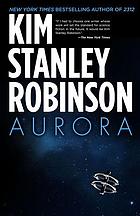 I have never read Kim Stanley Robinson before even though I have heard good things about him. Now that I have read Aurora, I know I’ll be reading more.
I have never read Kim Stanley Robinson before even though I have heard good things about him. Now that I have read Aurora, I know I’ll be reading more.
This is a science fiction story that is often heavy on the science. I don’t mind though because I do enjoy thinking about the consequences of long distance space travel. Even though Aurora takes place several centuries in the future, it is not one of those science fiction stories in which the science is more like magic and solves all our problems. The book is about a generation ship, a ship consisting of ecological biomes and about 2,000 people who were sent out to settle the stars. Humans at the time the ship was sent out had begun having success settling the solar system and believed they were ready to expand further.
After 170 years of traveling to the distant Tau Ceti system, the ship has finally arrived. Of course those arriving were not the ones who volunteered for the trip and a good many on the ship are pissed off that their predecessors chose their lives for them. They have been in what has begun to feel like a prison for a very long time and are ready to leave and settle this supposedly dead moon that has still managed to have water and oxygen.
There is a lot they have to figure out. The days and nights are not equal to Earth days and nights but are much longer. How do they adapt the plants they brought with them to such a day/night cycle? The moon they are to colonize also has a constant wind blowing, not a gentle breeze, but often hard enough to knock people over. They are also beginning to suffer the effects of having such a small genetic pool. Not to mention the systems in the ship itself are showing larger and larger metabolic rifts. But these humans are determined to make a go of it for no other reason than they can’t bear to live on the ship any longer.
But it turns out the planet is not dead after all. One of the landing crew is infected with something after she sinks in some mud and cuts her leg. Soon all of the people who had been on the surface setting up the foundations of the new settlement are sick and dying. The virus is completely alien and no one knows how to stop it. Within a week all 70 of the people who were on the moon are dead. Those on the ship have a decision to make. There are those who want to stay in the Tau Ceti system and try again on another moon. The other half of the population wants to go back to Earth because this colonizing the stars things is a bunch of baloney. In the end half stay and half return to Earth. It is the group that decides to return to Earth that the book follows from here.
It took me a while to warm up to the book but I am glad I stuck with it. The reason it was hard is because the main narrator is the ship’s AI which came into “consciousness” because of one of the crew members. As the ship learns to tell the story of its humans there is much musing over language and how inadequate it is, about metaphors and how imprecise they are, that kind of thing. AIs trying to figure out human language is not all that interesting to me and it felt sometimes like it was just an opportunity for Robinson to do his own musing through the mouthpiece of the ship.
But then something clicked and I can’t say what. And Ship began to grow on me until Ship becomes a full character in its own right. The ship trying to figure things out doesn’t stop. Eventually the ship starts to wonder about what it means to be conscious and of course, by extension, what it means to be human.
There is also a lot in the book about ecosystems and balance, the needs of the many versus the needs of the few, about choices and who gets to make them and what the consequences of choices are and who has to face them. It is also really interesting that a book about settling the stars kind of ends up being against it. Not against exploration per se, but there is the suggestion that because humans evolved on Earth that is the place they are suited to live and no other. Sure, we may eventually create colonies on other planets in our solar system, but in the book even the people living on the colonies have to return to Earth every ten years or so for their mental and physical health. It is a pleasantly subtle and different way to emphasize that Earth is our home and we need to take care of it for all our sakes.
A good and thought-provoking book. Well written and completely plausible. I recommend it to anyone who likes think-y science fiction with actual science in it.
Filed under: Books, Reviews, SciFi/Fantasy Tagged: Generation ship, Kim Stanley Robinson, Space exploration


